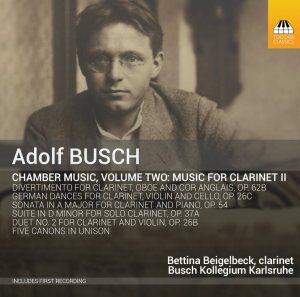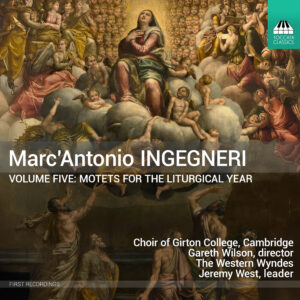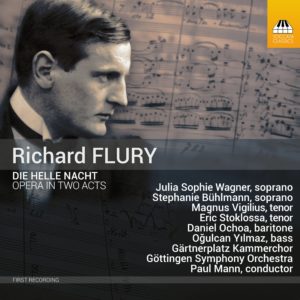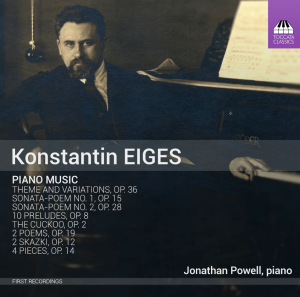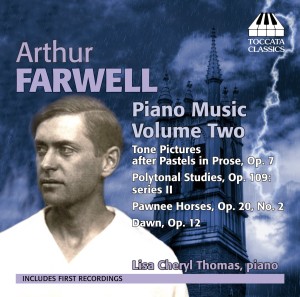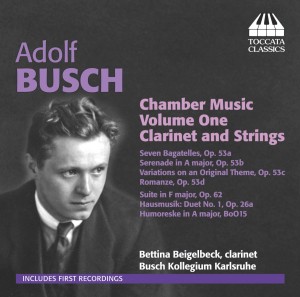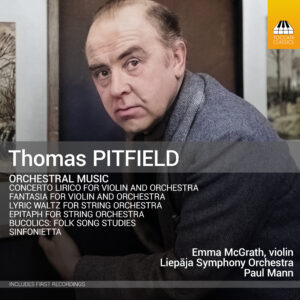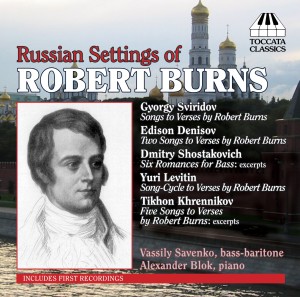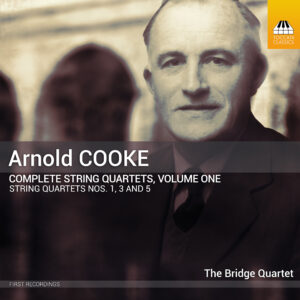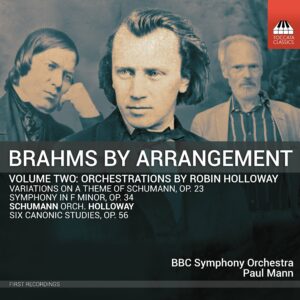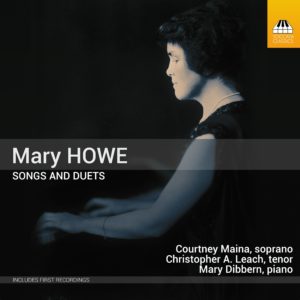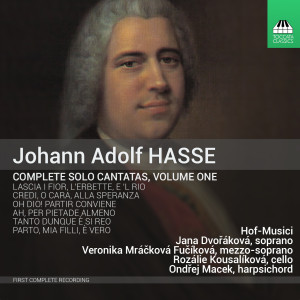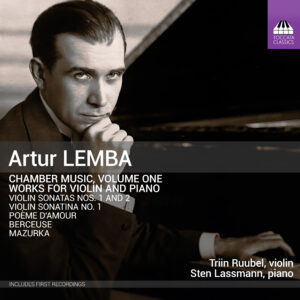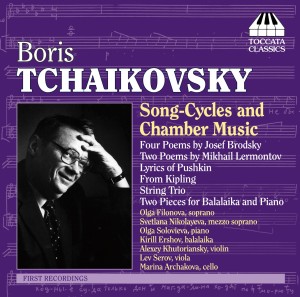Search Results for "The Black Alley Newty Ping" – Page 9
Showing results for black alley net ping
Adolf Busch: Chamber Music, Volume Two: Music for Clarinet II
Adolf Busch (1891–1952) enjoys a reputation as one of the greatest of all violinists: his recordings of Beethoven with the Busch Quartet have never been surpassed. But Busch was also one of the major composers of his day, equally natural as contrapuntist and melodist, with a style that owed much to his boyhood idol, Max Reger. Yet, always a man of principle, he sacrificed his career as both violinist and composer with his dignified refusal to perform or be performed in Nazi Germany. This second CD of his lyrical writing for clarinet, one in a series of recordings of Busch’s light-filled chamber music, is part of the rediscovery of one of the leading musicians of his day.
Bettina Beigelbeck, clarinet; Busch Kollegium Karlsruhe
Marc’Antonio Ingegneri, Volume Five: Motets for the Liturgical Year
The Choir of Girton College, Cambridge, continues its pioneering exploration of the music of the Italian Renaissance master Marc’Antonio Ingegneri (c. 1535/36–92) with a journey through the liturgical year, as mirrored in Ingegneri’s motets. A ‘concept album’ of Renaissance polyphony may be an unusual undertaking, but this one illustrates how Ingegneri took his lead from the emotions implicit in each major celebration of the church – from sorrow and awe to joy and jubilation – expressed in music of extraordinary beauty, belying the internal complexity that gives it its emotional power.
Choir of Girton College, Cambridge
Gareth Wilson, director
The Western Wyndes
Jeremy West, leader
William Beaton Moonie: Chamber and Instrumental Music, Vol. One: Music for Solo Piano
The music of the Edinburgh composer William Beaton Moonie (1883–1961) is as good as unknown. This first-ever album devoted to his piano music reveals a figure downstream from Schumann, Brahms and Grieg, writing in a conservative Romantic idiom coloured by echoes of the folk-music of his native Scotland. Many of these pieces, indeed, are concerned to evoke images of the Scottish countryside or suggest aspects of Scottish history.
Christopher Guild, piano
Richard Flury: Die helle Nacht, Opera in Two Acts
Die helle Nacht (‘The Bright Night‘), the second opera by the Swiss composer Richard Flury (1896–1967), enjoyed only a single radio broadcast in 1935, the year of its completion, and then remained unheard until this recording. It is revealed as a passionate mixture of sexual jealousy, obsession and murderous revenge, until love and reason ultimately prevail. Flury responded with some of his most ardent music, poised between the late Romanticism of Richard Strauss and occasional more modernist touches that reveal an admiration for Alban Berg – with a further link to Vienna in Flury’s fondness for waltz rhythms.
Julia Sophie Wagner, soprano
Stephanie Bühlmann, soprano
Magnus Vigilius, tenor
Eric Stoklossa, tenor
Daniel Ochoa, baritone
Oğulcan Yılmaz, bass
Gärtnerplatz Kammerchor
Göttingen Symphony Orchestra
Paul Mann, conductor
Konstantin Eiges: Piano Music
Konstantin Romanovich Eiges (1875–1950), a member of a gifted Jewish family from eastern Ukraine, studied both in medicine and music in Moscow, but soon became known as an outstanding composer and pianist. His music bears the impress of Taneyev, his teacher, and of Skryabin and has points in common with his friends Medtner and Rachmaninov, but this first recording of his piano music reveals a figure who deserves to be remembered in his own right.
Jonathan Powell, piano
Arthur Farwell: Piano Music, Volume Two
The American composer Arthur Farwell (1872-1952) is remembered as the leading member of a group of 'Indianists' who used Native American tribal melodies. But Farwell's stylistic range was much wider than is realised today. This second CD of his piano music presents not only two Indianist pieces but also the early character-pieces Tone Pictures after Pastels in Prose and the experimental Polytonal Studies, which pit two different keys against each other to generate unusual harmonies.
Lisa Cheryl Thomas, piano
Adolf Busch: Chamber Music, Volume One
Adolf Busch (1891-1952) enjoys a reputation as one of the greatest of all violinists: his recordings of Beethoven with the Busch Quartet have never been surpassed. But Busch was also one of the major composers of his day, equally natural as contrapuntist and melodist, with a style that owed much to his boyhood idol, Max Reger. Yet, always a man of principle, he sacrificed his career as both violinist and composer with his dignified refusal to perform or be performed in Nazi Germany. This CD of his lyrical writing for clarinet, the first in a series of recordings of Busch's light-filled chamber music, is part of the rediscovery of one of the leading musicians of his day.
Bettina Beigelbeck, clarinet
Busch Kollegium Karlsruhe
Thomas Pitfield: Orchestral Music
Thomas Pitfield (1903–99) was a polymath: artist, bookbinder, cabinet-maker, calligrapher, cartoonist, composer, designer, poet, printmaker and more. He brought to his compositions the same skill and craftsmanship as to his other activities, but during his long lifetime his personal modesty impeded a general awareness of his achievements. Pitfield’s fondness for folk-music sites his music within the broad tradition of English pastoralism established by Vaughan Williams, Finzi, Howells and others – though a touch of steel can occasionally be heard behind the lyricism.
Emma McGrath, violin
Liepāja Symphony Orchestra
Paul Mann, conductor
Russian Settings of Robert Burns
Robert Burns enjoyed a particular following in both Imperial and Soviet Russia as an idealised 'people’s poet’. In the mid-twentieth century Samuel Marshak’s best-selling translations of Burns came to rival Pushkin in popularity and provided a fresh stimulus to Soviet composers – some of whom may have seen Burns’ radical views as a useful cloak for their own non-conformist views.
Vassily Savenko, bass-baritone
Alexander Blok, piano
Arnold Cooke: Complete String Quartets, Volume One
The music of the Yorkshire-born Arnold Cooke (1906–2005) – solidly constructed, inventively contrapuntal, lyrical and energetic in turns – does not deserve the neglect it suffered even in its composer’s lifetime. This first album, of two presenting all five of Cooke’s string quartets, underlines his reputation for resourceful craftsmanship, presented in a style which sits downstream from Paul Hindemith, with whom he studied in Berlin, and from Béla Bartók.
The Bridge Quartet
Colin Twigg and Catherine Schofield, violins
Michael Schofield, viola
Lucy Wilding, cello
Brahms by Arrangement, Volume Two: Orchestrations by Robin Holloway
Composers who orchestrate the music of earlier colleagues often serve them best when they add something of themselves to the work in hand. These three orchestrations by the English composer Robin Holloway (b. 1943) demonstrate his profound understanding of and affection for two of the most important Romantic composers – and his re-imagining of Brahms’ Sonata for Two Pianos (which Brahms himself recast as his Piano Quintet) as a symphony gives one of the greatest of all compositions a wild and thrilling energy, making it also a masterpiece of our own age.
BBC Symphony Orchestra
Cellerina Park, leader
Paul Mann, conductor
George Enescu: The Unknown Enescu, Volume Two
Although Enescu gave opus numbers to only 33 of his works, he left an enormous number of pieces in varying stages of composition, from sketches and draft outlines to isolated movements and some scores that are almost complete. Working with a handful of composers and musicologists – fellow Romanians with specialist knowledge of Enescu’s style – the violinist Sherban Lupu has produced performing editions of a number of previously unknown works, heard here in the context of other Enescu rarities. One of these ‘rescued’ pieces, hiding behind the modest title of Caprice Roumain, is nothing less than a major violin concerto.
Sherban Lupu, violin
Ian Hobson, piano (Track 1), conductor (Tracks 8–11)
Viorela Ciucur, piano (Tracks 3–7)
Sinfonia da Camera (Tracks 8–11)
Mary Howe: Songs and Duets
The name of Mary Howe (1882–1964) seems to have vanished from the history books. But she was an important voice in American music in the first half of the twentieth century, as an activist and organiser, as a concert pianist and, especially, as a composer. This pioneering album of her songs shows her late-Romantic style open to influences from Debussy, Mahler, Richard Strauss and other contemporaries: she was, she said, ‘alert for new sensations, like a Puritan on a holiday’.
Courtney Maina, soprano (tracks 1,2, 4, 10-13, 15, 16, 19, 20, 22)
Christopher A. Leach, tenor (tracks 1, 3, 5-10, 13, 17, 18, 21, 22)
Mary Dibbern, piano
Johann Adolf HASSE: Complete Solo Cantatas, Volume One
In his own day Johann Adolf Hasse (1699–1783) was enormously popular as a writer of operas – Burney described him as ‘superior to all other lyric composers’. His chamber cantatas were written for private performance in the palaces of the powerful, where Hasse enjoyed the patronage of the very highest ranks of society: some of his cantatas may even have been sung by the empress Maria Theresa herself. But with the eclipse of his fame after his death, these works were scattered across Europe, and this first complete recording was made possible only by many years of detective work. They reveal, even on this smaller scale, the keen sense of drama that animated his operas.
Featuring:
Hof-Musici
Jana Dvořáková, soprano
Veronika Mráčková Fučíková, mezzo-soprano
Rozálie Kousalíková, Baroque cello
Ondřej Macek, harpsichord
Artur Lemba: Chamber Music, Volume One
The music of Artur Lemba has been strangely neglected, even in his native Estonia – although during his lifetime (1885–1963) he was held in high regard as pianist and teacher. That oversight is all the more surprising in view of the expansive, passionate lyricism of his writing – listeners who enjoy the music of Tchaikovsky and Rachmaninov are likely to find Lemba’s appealing. This first release in a pioneering series discovering his chamber music is accompanied by two historical recordings, one with the composer himself at the piano, and the other, a century old, of the one Lemba miniature to achieve some degree of popularity.
Triin Ruubel, violin
Sten Lassman, piano
Boris Tchaikovsky: Song-Cycles and Chamber Music
Boris Tchaikovsky (1925-96) – no relation to his better-known namesake – was one of the leading Russian composers of the twentieth century. A student of Shebalin, Shostakovich and Myaskovsky at the Moscow Conservatory, Tchaikovsky soon evolved an individual style that steered clear of ideology and fashion. Paradoxically, the apparent simplification of his musical language and growing refinement of its gestures sharpened its emotional impact. Tchaikovsky’s music has recently been attracting attention in the West; this CD closes some of the gapes in his growing discography.
Olga Filonova, soprano
Svetlana Nikolaeva, mezzo soprano
Olga Solovieva, piano
Kirill Ershov, Balalaika
Alexey Khutoriansky, violin
Lev Serov, viola
Marina Archakova, cello
Stay In the Know
JOIN THE TOCCATA NEWSLETTER
"*" indicates required fields
By visiting our site, you agree to our privacy policy regarding cookies, tracking statistics, etc.
